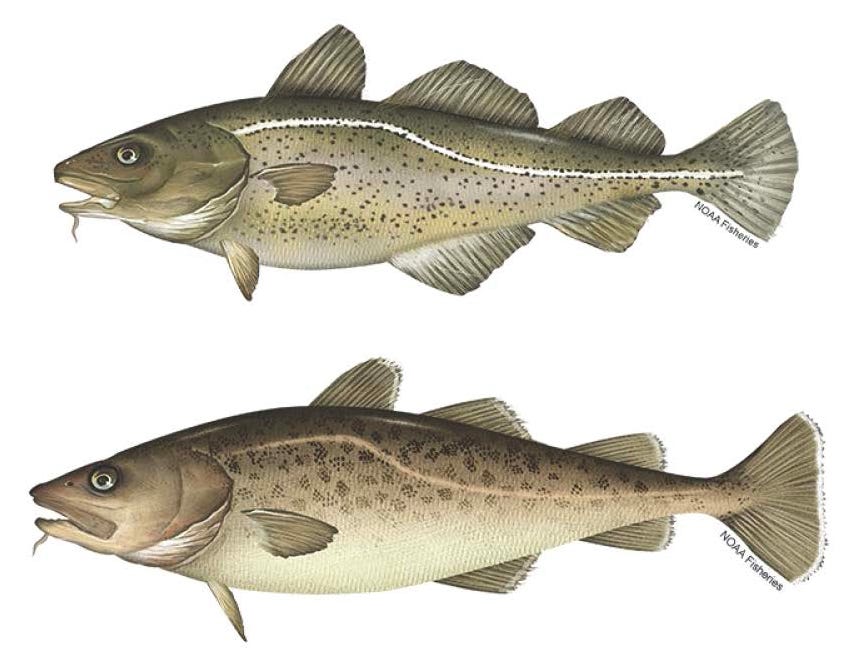If you are old enough, you may remember wrinkling your nose and making faces when confronted by a spoonful of foul-smelling and nasty-tasting cod liver oil. Turning your head away, pursing your lips, pushing the spoon away with your hand … your mother or grandmother simply waited you out and inevitably in went the spoon. This young fella seems generously compliant.
While dosing cod liver oil has long fallen out of favor, this practice has been in use for centuries. Mothers in cold, northern climates such as Norway, Sweden, Finland and Scotland observed that their children given cod liver oil were less susceptible to colds and flu.
What’s the magic? Cod liver oil stands out amongst the various fish oils; high in omega-3 fatty acids, it also contains vitamins A and D. Let’s look at the benefits.
Omega-3 fatty acids have been linked to brain and heart health, reduced inflammation, and protection against chronic conditions. Fish-eating communities have been observed to have low incidence of heart disease. Leaf, A., “Historical overview of n-3 fatty acids and coronary heart disease,” Am J Clin Nutr 87(6):1978S-80S (Jun 2008). https://doi.org/10.1093/ajcn/87.6.1978S See also, Buettner, Dan, The Blue Zones Secrets for Living Longer: Lessons From the Healthiest Places on Earth (National Geographic, August 29, 2023).
Long-term inflammation is a driver of every chronic disease; omega-3 fatty acids reduce the production of molecules that drive inflammation. Furman, D., et al., “Chronic inflammation in the etiology of disease across the life span,” Nat Med25(12):1822-1832 (Dec 2019). https://doi.org/10.1038/s41591-019-0675-0; Kavyani, Z., et al., “Efficacy of the omega-3 fatty acids supplementation on inflammatory biomarkers: An umbrella meta-analysis,” Int Immunopharmacol 111:109104 (Oct 2022). https://doi.org/10.1016/j.intimp.2022.109104
Omega-3 fatty acids may benefit depression, one of the most common worldwide mental disorders, and anxiety. Liao, Y, et al., “Efficacy of omega-3 PUFAs in depression: A meta-analysis,” Transl Psychiatry 9(1):190 (Aug 5, 2019). https://doi.org/10.1038/s41398-019-0515-5 Erratum in: Transl Psychiatry 11(1):465 (Sep 7, 2021). https://doi.org/10.1038/s41398-021-01582-6
Some studies have shown that omega-3 fatty acids reduce symptoms of attention deficit hyperactivity disorder (ADHD) in children. They help attention focus and task completion, and reduce restlessness and impulsiveness. Bloch, M. & A. Qawasmi, “Omega-3 fatty acid supplementation for the treatment of children with attention-deficit/hyperactivity disorder symptomatology: systematic review and meta-analysis,” J Am Acad Child Adolesc Psychiatry 50(10):991-1000 (Oct 2011). https://doi.org/10.1016/j.jaac.2011.06.008
One type of omega-3 fatty acid, docosahexaenoic acid (DHA), is associated with a reduced risk of nerve damage and age-related macular degeneration (AMD). Jiang, H, et al., “Dietary omega-3 polyunsaturated fatty acids and fish intake and risk of age-related macular degeneration,” Clin Nutr 40(12):5662-5673 (Dec 2021). https://doi.org/10.1016/j.clnu.2021.10.005
Rheumatoid arthritis is an autoimmune disease that affects the body’s joints. As discussed above, omega-3 fatty acids help reduce inflammation throughout the body, including the joints. Thus it can offer symptom relief from pain, swelling and stiffness associated with rheumatoid arthritis. Gruenwald. J, H. Graubaum, & A. Harde, “Effect of cod liver oil on symptoms of rheumatoid arthritis, Adv Ther 19(2):101-7 (Mar-Apr 2002). https://doi.org/10.1007/BF02850059; Galarraga, B., et al., “Cod liver oil (n-3 fatty acids) as an [sic.] non-steroidal anti-inflammatory drug sparing agent in rheumatoid arthritis,” Rheumatology (Oxford). 47(5):665-9 (May 2008). https://doi.org/10.1093/rheumatology/ken024 The vitamin D in cod liver oil also helps the body’s response to other autoimmune diseases such as multiple sclerosis (MS) and Sjögren’s disease.
[No, I had never heard of Sjögren’s disease until I was researching cod liver oil. It is an autoimmune disease that causes chronic dryness throughout your body; your glands do not produce enough moisture throughout your body. The most common symptom is chronic dryness in your eyes, mouth or vagina. Now you know as much as I do.]
A significant percentage of the global population, estimated 25 percent, have non-alcoholic fatty liver disease (NAFLD), an accumulation of fat in the liver. Omega-3 fatty acids reduce inflammation and can help reduce liver fat. Lee, C., et al., Effects of Omega-3 Polyunsaturated Fatty Acid Supplementation on Non-Alcoholic Fatty Liver: A Systematic Review and Meta-Analysis, Nutrients 12(9):2769 (Sep 11, 2020). https://doi.org/10.3390/nu12092769
Omega-3 fatty acids contribute to reducing age-related mental decline and a corresponding reduced risk of Alzheimer’s disease. Martí Del Moral, A., & F. Fortique, “Omega-3 fatty acids and cognitive decline: a systematic review,” Nutr Hosp36(4):939-949 (Aug 26, 2019) English. https://doi.org/10.20960/nh.02496
Cod liver oil is a fabulous source of vitamin D that can help reduce bone loss and improve bone strength because vitamin D helps your body absorb calcium from your intestine. Wimalawansa, S., M. Razzaque, & N. Al-Daghri, “Calcium and vitamin D in human health: Hype or real? J Steroid Biochem Mol Biol 180:4-14 (Jun 2018). http://doi.org/10.1016/j.jsbmb.2017.12.009; Kazemian, E., et al., “Effect of supplemental vitamin D3 on bone mineral density: a systematic review and meta-analysis,” Nutr Rev 81(5):511-530 (Apr 11, 2023). https://doi.org/10.1093/nutrit/nuac068
Additionally, vitamin D3 boosts overall immune strength by regulating immune responses so that your immune system appropriately responds to pathogens and other infections. It boosts production of peptides that help defend against bacteria, fungi, and viruses. Sanlier. N., & M. Guney-Coskin, “Vitamin D, the immune system, and its relationship with diseases,” Egypt Pediatr Assoc Gazette 70(1):39 (2022). https://doi.org/10.1186/s43054-022-00135-w
The vitamin A in cod liver oil is essential for many bodily processes including maintaining healthy vision, and ensuring proper function of organs and the immune system. Vitamin A also aids in the proper development of babies in the womb. One of the most significant effects of vitamin A is its effect on eye sight. Vitamin A can prevent blindness during childhood and plays a vital role in eye development. It plays a role in the manufacture of rhodopsin, a pigment found in the retina that is highly sensitive to light. Rhodopsin helps you see better in the dark. Sajovic, J., et al., “The Role of Vitamin A in Retinal Diseases,” Int J Mol Sci 23(3):1014 (Jan 28, 2022). https://doi.org/10.3390/ijms23031014
You should now be impressed with the power of cod liver oil. What about all of the other available “fish” oils? We can start with simple linguistics; cod liver oil comes from the livers of codfish. Atlantic cod and Pacific cod are the two most common sources.
“Fish oils” typically come from the whole of fatty fish such as herring, tuna, anchovies, mackerel or salmon.
Another distinction is the processing of the fish; cod liver oil is only extracted from the liver of the codfish. The highest quality cod liver oil comes from traditional mechanical processing and fermenting of the cod liver oil. On the other hand, the entire fish is processed to make fish oil, using either chemical or mechanical means. Mechanical processing is more time-consuming but produces higher quality oil than chemical processes. Fish oil is good, cod liver oil is better.
We have to make a distinction that often causes confusion, especially with respect to children; that is castor oil versus cod liver oil. Castor oil is a vegetable oil derived from pressing the seeds of the Ricinus communis plant, commonly known as the castor bean plant.
While both cod liver oil and castor oil have been used for centuries as traditional healing remedies, there are significant differences between the two. Cod liver oil provides omega-3 fats EPA (eicosapentaenoic acid) and DHA (docosahexaenoic acid), while castor oil is high in ricinoleic acid, an omega-9 monosaturated fat. Castor oil delivers antioxidants like vitamin E; cod liver oil is highest in fat-soluble vitamins A, D, E and K.
Aside, research shows that Vitamin K2 and D3 work together to enhance calcium metabolism, ensuring calcium is effectively absorbed and directed to the bones, which helps improve bone density and strength. The combination also supports cardiovascular health by preventing calcium from depositing in arteries, thus reducing the risk of heart disease.
Back to castor oil and cod liver oil. Castor oil is typically used topically to treat skin and hair, and orally as a laxative. Cod liver oil is taken primarily orally. Neither cod liver oil nor castor oil taste great themselves.
Another aside, we can of course engage in the great debate whether your body needs animal fats (you do) or whether plant-based fats are sufficient (nope). Another time, another post.
Now another great debate … pills versus liquids. Walk into any store that sells supplements … wall to wall bottles, boxes, vials of every size, shape and claim … “pure,” “natural,” “organic,” “non-GMO,” “fast acting,” “highest potency,” “fastest acting,” and on and on. In some sense this distinction is the same as the debate about eating whole foods rather than extracts. Which is better for you, a glass of orange juice or eating a whole orange? Wide ranging research supports the benefits of eating whole foods in their most natural form rather than processed foods. Research supports the same conclusion with respect to supplements, best in their natural form and without additives.
Ingredients: Alaskan Cod Liver Oil, Organic Lemon Sourced from: Dutch Harbor, Alaska
Cod liver oil is truly Mother Nature’s elixir.









Very interesting!!!!
Great insights on this wonderful nutrient!